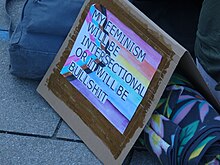Intersectionality
This article does not have any sources. (April 2024) |
| Part of a series on |
| Feminism |
|---|
 |

Intersectionality or intersectional theory studies the relation between the many different ways that people are kept in a lower social position, controlled, and left out of important parts of society because of their differences. Kimberlé Williams Crenshaw gave the name "intersectionality" to this concept in 1989.
Sometimes, a society decides that a group of people is different from itself. When they do this, they other that group or marginalize them. Intersectionality points out that people are often othered for more than one reason.
These reasons might be
- gender
- race
- class
- ability
- sexual orientation
- religion
- caste
- age
- nationality
- language
- or other parts of identity.
Because of this, it suggests that these types of othering cannot be looked at by themselves. They must be looked at together. For example, a person can be othered because they are a woman, a person of color, a poor person, and a disabled person at the same time. These different forms of othering make each other worse, shape, and prop each other up. This means that the experience of being othered for all of these reasons differs from what would happen if you added them. Because of this, fighting each one alone would not help the people who experience many of them together.
Intersectionality says that the different ways people are othered and forced into a lower social position, such as racism, sexism, classism, ableism, homophobia, transphobia, xenophobia and bigotry based on belief, create an entire system. In this system, each of the ways people are held down by society contributes to the other. So if someone wanted to understand how society began to other a group of people as a race apart from themselves (racialization), they would have to look into the ways that gender, class, sexuality, and other parts of identity shaped this process.
Intersectionality began as a way to understand how women of color in American society were othered. The women who developed the theory were challenging the feminism of their time. They saw it as being too focused on the issues of wealthy white women. They felt this left behind the women who needed feminism the most and only helped the women who already had the most power. They were also criticizing the Civil Rights Movement. They saw it as being too focused on men and leaving women of color behind. They believed they had a place in both of these movements and that these parts of their lives could not be separated. The intersectional theory quickly grew to include the relation between the many other ways people are othered and kept in a lower social position, such as sexuality, ability, and the gender binary.
